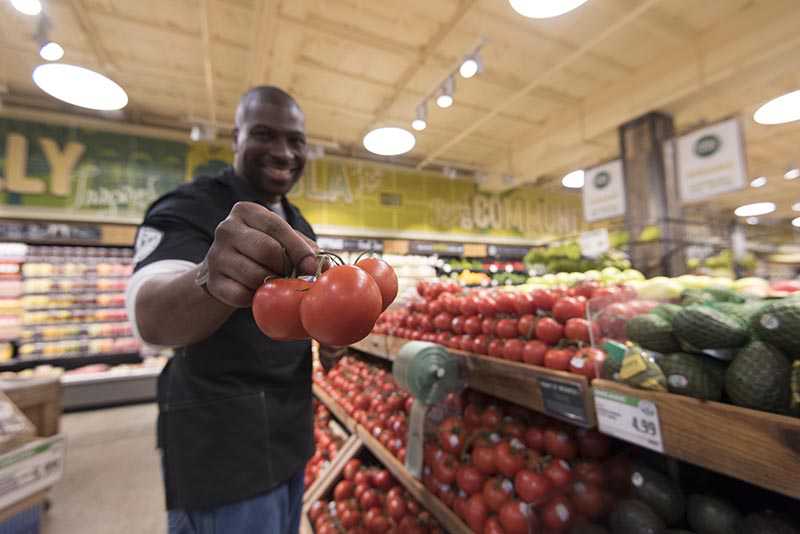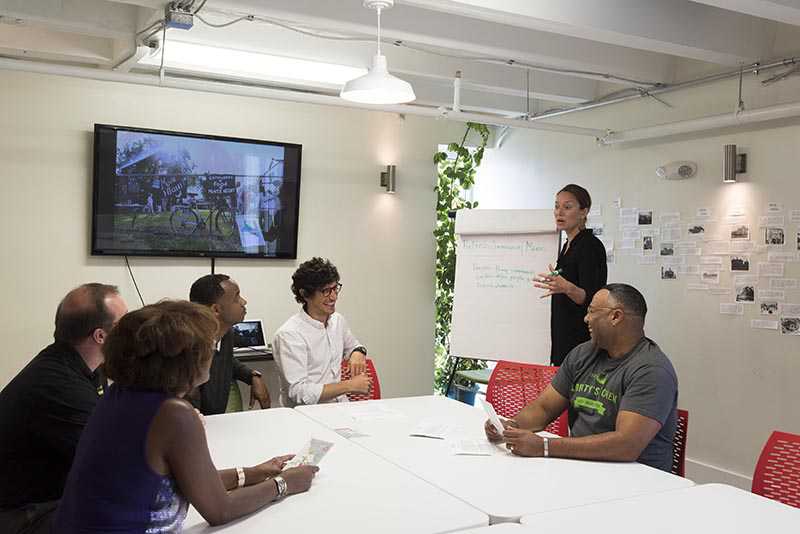Making groceries is tough when you live in a food desert. Yet that’s exactly the plight that faced the neighbors up and down New Orleans’ Broad Street corridor when the Robért Fresh Market, located in the iconic Schwegmann Giant Supermarket building in Mid-City, closed after Hurricane Katrina.
“Schwegmann’s was in walking distance of our community, it was a big supermarket,” recalled Deborah V. Chapman, who grew up and still lives in the neighborhood on North White Street. “All of a sudden, we didn’t have anything but corner stores.” When her family moved to the area in 1970, her block was diverse, a mix of working class white and black folks, most of whom owned their homes. “Then a lot of people moved east and across the lake. The neighborhood changed,” she said.
Broad Street knits together four neighborhoods along the corridor: Faubourg St. John, Treme, Mid-City, and Lower Mid-City, which used to be called Tulane-Gravier. Its revitalization, which follows similar paths of change seen along Freret Street, South Rampart Street, and St. Claude Avenue, had an early champion in Jeffrey Schwartz, a native New Orleanian with a background in urban planning and community development. Although he grew up closer to City Park, Schwartz is passionate about “backatown” neighborhoods, urban swaths teeming with culture and the prized traditions that continue to set New Orleans apart.
“In its heyday, the neighborhood between Broad Street and Claiborne Avenue was one of the wealthiest black commercial districts in the country, second only to Harlem in New York City,” said Schwartz, founder and executive director of a small nonprofit, Broad Community Connections. What happened next was paralleled in so many African American neighborhoods in the ‘60s and ‘70s, a complex roil of social and economic marginalization that led to deep pockets of disinvestment, blight, and poverty. Add in a catastrophic flood, and being a food desert was the least of this neighborhood’s worries. Yet despite this bleak landscape, a partnership between neighbors, social services, and fresh food providers, including Whole Foods, emerged to lead the charge for change.

Vision and Partnership
Broad Community Connections started in 2008 with the idea of community development and commercial revitalization. The 65,000-square-foot former Schwegmann supermarket was the lynchpin in the big picture, figuring into an exhaustive planning process that went through a slew of changes, but finally wound up as the ReFresh Project, a fresh-food hub located on North Broad Street at Bienville. Anchored by a 25,000-square-foot Whole Foods store (the smallest in Louisiana), the grassroots project includes on-site tenant partners Liberty’s Kitchen, The Goldring Center for Culinary Medicine at Tulane University; FirstLine Schools’ central offices; Boys Town center for children and families; Crescent City Community Land Trust; and an on-site teaching farm in partnership with SPROUT NOLA, Harambee Gardens of New Orleans, and Faubourg Farms.
“We knew we needed a grocery store, and we knew we didn’t need anymore rent-a-centers and check cashing stores that really didn’t serve the community’s needs,” recalled Schwartz. “We also saw that we couldn’t sit on the sidelines and be cheerleaders. We had to get proactive.” Several big supermarkets got in on the conversation, but after years of back-and-forth talks and negotiation, it was Whole Foods, with its reputation as a purveyor of organics and niche goods aimed to an upscale market, that dug in and made it work. The store opened in February of 2014.
[You may also like "Farmers' Marketing: Local farmers use market psychology to set their harvests apart from the rest."]
Community Voices
To say the project was an uphill battle is putting it mildly. Skepticism on both sides of the economic divide was rampant. The road was paved with good intentions, but you know what they say about good intentions. “We knew that a Whole Foods was going to open, but the perception in our community was that we couldn’t afford to shop there,” said Chapman. “We thought it was all about them, that they owned the building and had nothing to do with us. We were wrong. But it took some doing to really understand what was going on.”
 Schwartz and team leaders from ReFresh partners, including Whole Foods, met with Chapman and other community leaders, and the resulting and ongoing conversation has made a world of difference. “Community buy-in and trust doesn’t happen once,” Schwartz said. “It is something we work at every day.”
Schwartz and team leaders from ReFresh partners, including Whole Foods, met with Chapman and other community leaders, and the resulting and ongoing conversation has made a world of difference. “Community buy-in and trust doesn’t happen once,” Schwartz said. “It is something we work at every day.”
Chapman, a long-time community leader, advocate, and mentor of young women and families of women who are incarcerated, was well aware of the changes going on in her neighborhood. Folks, many of them white, were coming in and buying blighted properties, and there was a disconnect between the longtime locals and the newcomers, including her own neighbors. Her family owned a nearby double lot that, while vacant, wasn’t abandoned. “I had people parking cars there, using it as a dog park, doing whatever they wanted. It was disrespectful, even if that was not the intent.”
That family plot played a key role in bringing the ReFresh Project into the neighborhood conversation. Chapman offered to host a community movie night, supported by ReFresh partners, in June 2015. “The point was to introduce folks to who and what we are in a place they were already comfortable,” explained ReFresh coordinator Liz Burpee.
“We had 150 people show up,” recalled Chapman. “That first movie night brought everybody together. We didn’t know there was a health clinic (The Ruth U. Fertel Tulane Community Health Center at 711 North Broad Street) that gave out vouchers for fresh vegetables (a 2015 summer program). We didn’t know about the community garden and the kids’ camp and the cooking classes,” said Chapman, now a leader of ReFresh’s community engagement committee. “That event got everybody together—and from then on relationships with the neighbors improved dramatically.”
[You may also like "Nola Tilth: An urban flower farm."]
With the support of both onsite and offsite partners—sixty-plus groups in all—community outreach is constant and ongoing. “We have fantastic programs, but none of it matters if we don’t reach the people who need it most,” said Burpee, who comes from a background in social work and community health. “Sorry, Kevin Costner, but if you build it, people don’t necessarily come.”
“Our biggest thing was to come into the community with open ears and listen,” said Ernest “E-Roy” Roy, a West Bank native who manages the Broad Street Whole Foods store, which employs 175 local team members. “We have a phenomenal store and we’re working hard to be part of this neighborhood.” Making fresh, healthful food available, along with reasonably priced prepared meals and a host of community food-related events and free programs, folds into the Whole Foods and ReFresh mission.
“It’s taken a while; the neighborhood is now talking to each other and involved,” added Chapman. “We want this to be a good and safe place to raise our kids and our grandchildren. We all want that.” With ReFresh now a part of the neighborhood, family values and access to tasty, nutritious food can commingle, a recipe for better quality of life now and in the future.
Partners
The sixty-plus ReFresh Partners are a diverse collective delivering a wealth of services to the Broad Street corridor and greater New Orleans community. Here’s a snapshot of what a few of them do:
Whole Foods: The store spotlights local products and artisans, and its 365 brand is priced on par with groceries available at other locally owned stores (although you can still get pricey gluten-free pancake mix and other higher priced goods). The Whole Kids Foundation and Whole Planet Foundation underwrite a slew of local programming, including health fairs at places like the Zulu Social Aid & Pleasure Club and a summer camp for kids on the onsite ReFresh Farm.
Tulane University Goldring Center for Culinary Medicine Housed in a stunning demonstration kitchen, the center trains future doctors in hands-on nutrition to help them better heal patients and serve communities. These doctors-in-training in turn lead free community cooking classes, six-week programs so popular that there’s always a three-hundred-person waiting list.
Liberty’s Kitchen This café adjacent to Whole Foods is a social enterprise dedicated to transforming the lives of at-risk youths by providing a path to self-sufficiency through food-service-based training, leadership, and work-readiness programs. The Kitchen serves coffee and light fare, including soups, salads, and sandwiches.
Ruth U. Fertel Tulane Community Health Center Located on the site of the original Ruth’s Chris Steak House (and named for the pioneering restaurateur), this clinic opened in 2012, providing behavioral health, pediatric care, and a wide range of health services and amenities like a computer lab and a full time social worker to neighborhood residents.
The ReFresh Community Farm This teaching farm on the site of the Broad Street ReFresh Project helps increase fresh food and includes on-site programs like Volunteer for Veggies, urban growing apprenticeships, and gardening classes for adults, families, and children.

